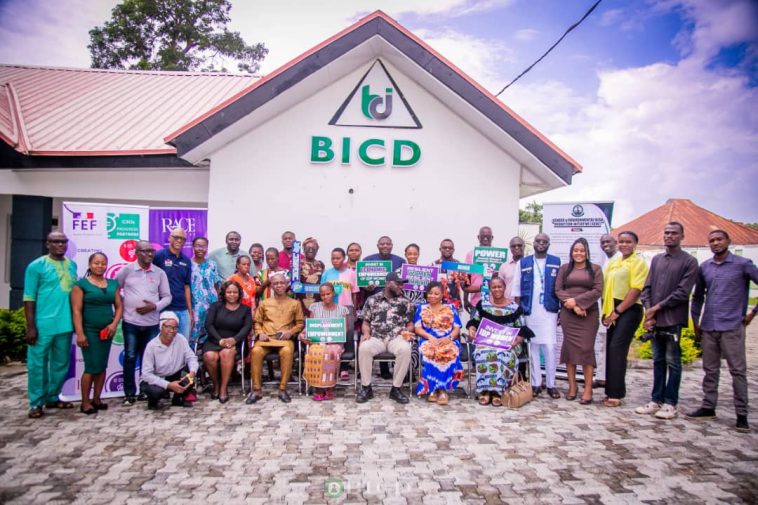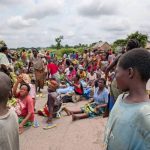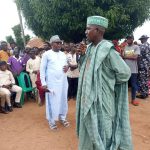From Dooshima Terkura, Makurdi
Stakeholders in Benue state have expressed their readiness to support women in conflict affected communities to make them economically viable.
The Centre for Redefining Alternative Civic Engagement (RACE Centre) and Gender and Environmental Risk Reduction Initiative (GERI), with support from the French Embassy, has convened a high-level advocacy forum on women’s economic empowerment in conflict-impacted communities under the POWER project.
At the forum were key government ministries and civil society organizations who addressed structural barriers facing women in crisis-affected settings.
The forum, which held in Makurdi, saw significant commitments from various state ministries including the Benue State Bureau for International Cooperation and Development (BICD), SMEDAN, Sexual Assault Referral Centre (SARC), Ministry of Humanitarian Affairs and Disaster Management, Women Affairs, Ministry of Trade and Investment, alongside representatives from civil society organizations and international organizations like the WHO, and financial institutions.
Pierre-Louis Bonnel from the French Embassy who joined the forum virtually, commended RACE Centre and all stakeholders for their commitment to women’s economic empowerment.
He stated that “The French Embassy applauds the collaborative efforts being demonstrated today and reaffirms continued support for programs that strengthen women’s economic participation as a cornerstone of sustainable peace and development in conflict-affected communities.”
The DG BICD, Leonard-Angelo Viashima commended RACE for its collaboration with GERI initiative. He highlighted the significance of working with the Benue Sexual and Referral Centre and urged government stakeholders to advocate for and support partners focused on improving the economic resilience of women who have suffered various forms of GBV in conflict-affected communities in Benue State.
During the session, the Statistician General of Benue State Bureau of Statistics, Kumafan Dzaan expressed the commitment to collaborate with RACE Centre and GERI in advancing women’s economic empowerment initiatives through data collection and analysis support.
The Coordinator of the Sexual Assault Referral Centre (SARC), Mrs. Linda Dirisu also pledged the organization’s commitment to integrate women’s economic empowerment into agricultural development programmes.
A representative of the Ministry of Trade and Investment promised to create enabling policies for women entrepreneurs, while representatives from various financial institutions committed to developing women-friendly financial products and services.
Women representatives from various Internally Displaced Persons (IDP) camps also participated actively, sharing their experiences and making their own commitments to support the project’s objectives and serve as advocates within their communities.
Earlier, welcoming participants to the forum, Executive Director of RACE Centre, Evelyn Ugbe, emphasized the critical nature of the issue. She explained that “According to the IOM Displacement Tracking Matrix, 500,182 individuals are living in Benue IDP camps, with reports indicating alarming rates of intimate partner violence and sexual violence against women in these settings.”
Ugbe stressed that women’s economic exclusion is not incidental but structural, serving as a driver of conflict.
She said “When women are economically empowered, communities are safer, recovery is faster, and peace is stronger. Women’s economic empowerment is not a development add-on, It’s foundational for peace and security and recovery,” she emphasized.
The forum featured a comprehensive needs assessment presentation that highlighted the specific challenges facing women in conflict-affected areas of Benue State.
The analysis revealed critical gaps in access to credit, markets, and skills development opportunities, while documenting the disproportionate impact of conflict on women’s economic activities. An interactive session allowed participants to share experiences and provide feedback on enhancing women’s economic empowerment strategies.
The advocacy forum successfully strengthened partnerships between government institutions, civil society organizations, and affected communities, creating a foundation for sustainable women’s economic empowerment initiatives. Representatives from various ministries shared evidence-based approaches demonstrating how women’s economic empowerment drives conflict prevention, peace building, and crisis recovery.
The POWER project continues to advocate for structural changes that will ensure women’s economic rights are protected and promoted, particularly in conflict-impacted communities where vulnerabilities are heightened.
The forum concluded with commitments from all stakeholders to work collaboratively toward creating an enabling environment for women’s economic participation and leadership in Benue State’s recovery and development processes.






